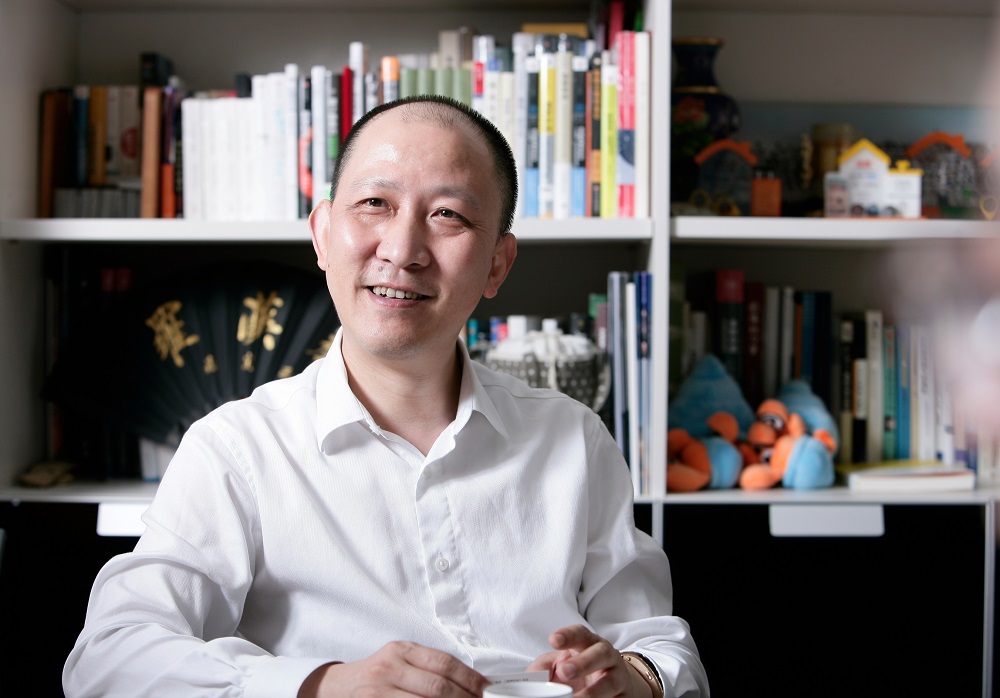罗军 千帆过尽 不忘初心

人物档案:
罗军
途家及斯维登集团联合创始人兼CEO
Profile
Justin Luo
Founder & CEO of Tujia & Sweetome Group
从Cisco、Oracle、Avaya诸多国际知名企业的高管,到带领新浪乐居成功上市纳斯达克,罗军将目光转向住宿业,担任途家及斯维登集团联合创始人兼CEO,开始了他的二次创业之旅。几次跨界、数番创业,在每每觉其已功成名就过上众人艳羡的生活之际,罗军却另辟蹊径,做出了出乎意料的选择。促使他做出这些意料之外的抉择背后,除了对未来市场精准预测的敏锐眼光,更重要的是一颗致力于改变住宿业格局的初心,对美好生活、美好居所的极致追求是贯穿于罗军整个创业史的关键元素,更是他构筑起从途家到斯维登多维度、跨疆域的商业逻辑基础。
罗军
途家及斯维登集团联合创始人兼CEO
Profile
Justin Luo
Founder & CEO of Tujia & Sweetome Group
从Cisco、Oracle、Avaya诸多国际知名企业的高管,到带领新浪乐居成功上市纳斯达克,罗军将目光转向住宿业,担任途家及斯维登集团联合创始人兼CEO,开始了他的二次创业之旅。几次跨界、数番创业,在每每觉其已功成名就过上众人艳羡的生活之际,罗军却另辟蹊径,做出了出乎意料的选择。促使他做出这些意料之外的抉择背后,除了对未来市场精准预测的敏锐眼光,更重要的是一颗致力于改变住宿业格局的初心,对美好生活、美好居所的极致追求是贯穿于罗军整个创业史的关键元素,更是他构筑起从途家到斯维登多维度、跨疆域的商业逻辑基础。
“尽量去做你喜欢的事情,哪怕失败了,你毕竟还在做一些开心的事情”,罗军坦言道。正是带着对于住宿业的热爱,罗军以其独到的商业视角、精准的战略定位、敏锐的商业嗅觉,借助消费升级的东风,拉起分享经济的风帆,乘风破浪,行稳致远。
扬帆启航 初露峥嵘
“创业最难的是起步”,这是罗军忆起创业旅程中的有感而发。海南是罗军所掌舵的这艘途家及斯维登集团商业巨轮的始航之地,二次创业便开始于此。
2011年,43岁的罗军从新浪乐居辞职,在海南三亚一手创立了途家(包含线上的途家网,以及线下的“途家自营”)。彼时,罗军与公司员工蜗居在一所民居里,同吃同住,开会、做饭都集中在一间小小的民宅里。罗军只是一个奔波游说于各个业主之间的普通人,无人曾识他的高管身份。面对罗军提出来的房租收益分成模式,习惯于传统包月收租模式的业主显得有些难以接受,甚至于将面前这位正口若悬河描绘着他的商业蓝图的人视为骗子、异类。时至今日,罗军仍记得第一位客户陈先生觉得这是一家皮包公司,直到上网搜索了罗军的履历,第二天才折返回来拿出两套房子与罗军签约。从一开始面对诸多业主的不信任,到第一份合同的签订,中间不知经历了多少焚膏继晷的修改策划,字字斟酌其中标点,终日奔波周旋的日月。
他带着他所构建的商业模型从2011年海南的40套房起步,带着那份致力于“让天下没有难分享的房子,让每个房子充满笑声”的真淳,扬帆出海,开启了星辰大海的征途,展露锋芒。
谋而后动 锋芒尽显
回望当初,有心者不难发现罗军在海南所提出的与业主分享收益的模式,正是如今势头正盛的分享经济的雏形。当分享经济浪潮席卷而来之时,房屋分享也是时尚的弄潮儿。业主可以将闲置的资产放到线上平台上与多方分享其资源,从中获得资金收益。
纵观其履历,在他每一次做出所谓“离经叛道”的选择之时,我们都能看到极为鲜明的时代烙印:新浪乐居的房地产“白银十年”、途家的“分享经济”潮流。似乎,当初的离经叛道,现在看来是颇有几分顺势而为,先见之明之意。
其实不然,罗军的成功绝非仅仅只是顺应潮流。对时代浪潮的精准预判只是这艘巨轮扬帆的先决条件,而要想乘风破浪、直济沧海,掌舵者的战略布控亦是关键所在。在途家线上已网罗大量流量,成为中国线上民宿行业最大入口之际,线下自营业务也颇具一定规模。此时身为掌舵者的罗军,并没有按部就班的沿原有轨迹航行,而是开辟了一片新天地。罗军认为,是时候将线上线下业务拆分,独立运营了。“线上和线下其实是两种不同的创业方式”。2015年,线上线下拆分独立运营,而途家自营也逐渐更名为斯维登集团,并将斯维登集团的总部安置在上海,途家作为线上平台其本部继续留守在北京。2018年3月,经过近三年的筹备与谋划,斯维登集团正式盛大发布并登场,这个专注于不动产运营及管理的集团,在登场之际就吸引了诸多关注。
这些关注不仅是来自于斯维登集团的新颖定位,与罗军的商业魅力密不可分。根据过往的经验与客户调查,罗军将现代住宿业消费者的需求划分为“多人、多天、个性化和高性价比”,基于此,罗军顺应需求,谋而后动,将旗下的斯维登公寓品牌进行精准划分,布局“融入城市、融入社区、融入自然,同时加之别墅类产品进行补充”的产品升级策略,并坚持“体验为王”的核心观念,在斯维登的公寓、欢墅别墅,安全门锁、洗护用品、入住流程等环节都已经实现了标准化,罗军甚至亲自为斯维登的门店经理和前厅员工设计了统一的制服。采用“统一的服务策略,一致的客户体验”,这是罗军一贯坚持的主张。正如他所言:“我们希望用自己的经验和教训来指导整个住宿分享行业,去完善它的标准,让服务更规范化。”
紧扣节奏 步步为营
2018年,中央一号文件中提出了实施乡村振兴战略的总要求:产业兴旺、生态宜居、乡风文明、治理有效、生活富裕。乡村振兴的国家政策,带来了变革。罗军认为,“实施乡村旅游扶贫工程,加强旅游基础设施建设,大力开发乡村旅游产品”等措施,实现了从农场到农庄,再到共享农庄,最后伴随着文化娱乐农产品的服务升级到分享经济。共享农庄作为2018年斯维登集团的重点项目,对于其战略定位,罗军有着自己的想法。“乡村的过去、从前和现在变化并不大,还是那些老屋,但乡村却从原来的人丁兴旺,到现在如此之凄凉。以前乡村都在务农,而现在种地的人很少。这是一个全世界的课题,科技的进步,生产关系的改变,城乡服务的不均衡,都迫切需要我们做出改进。”
早在2016年,罗军就提出“共享农庄”的概念,随后便开始紧扣节奏,着手落地。如今,罗军脑海中昔日关于中国乡村的意象图已被打造出“农庄建造+民宿运营+农产品销售”的共享农庄模型。通过斯维登集团的共享农庄项目,拥有农庄的周边城市的人都可以投入进乡村建设的浪潮之中,多方受益:庄园主将闲置乡村别墅委托斯维登集团旗下的欢墅运营,从中获取收益分成,同时享受全国交换入住权益;共享农庄的营运需要大量的劳动力,一定程度上为当地农民创造了数量可观的就业机会,更重要的是农民可以获得共享农庄的土地租赁收益,将美好乡村建设落实到了实处;对于消费者,与传统无序混乱的农家乐乡村游比较而言,共享农庄无疑提供一种服务品质更有保障、可持续发展的消费体验。
“从乡村出发,带世界回来”一直是罗军秉持的一份真淳,斯维登集团旗下C2B装配式建筑品牌途远,通过模块化装配技术,模块化装修之后通过集装箱运到目的地,最快仅需4个小时就能组装完成。将共享农庄项目覆盖至全国20多个目的地,同时还包括了海外十个国家和地区,目前,全国有100多个共享农庄项目正在进行中。

科技赋能 成就未来
站在生命体验的高度,重新结构住宿业,未来其实充满无限可能。在过去把握住创新机遇,并不代表能抢占持久的先机,要想让企业不断顺风而行,就必须看清未来的风向。站在时代的风口下,罗军客观分析业界走向,屹立在风口浪尖之上,寻找下一个黄金切入点。
罗军一直以来对于斯维登的定义都是科技驱动型公司,这一定义从斯维登的员工构成比重便可窥知一二。他提到,在斯维登上海办公室,约有三分之一的员工都是研发人员。罗军认为,科技为酒店赋能,但是科技却是分享民宿的核心。斯维登建立统一的会员管理系统和联络中心;让每个房间的客人都可以在物联网的体系下定义自己的场景;利用Bi(商务智能软件)和大数据提示游客价格的变化;用各种科技软硬件手段保证客人的人生安全、隐私等。从后台管理系统,到会员关系系统,再到智能安全软硬件设备,都是科技支撑着斯维登前行的动力。
目前住宿业已进入高速发展时期。最初单一的标准化酒店不再独占鳌头,精品酒店、民宿客栈、度假公寓、别墅、短租民宿等多元化主题都是延伸的方向。罗军认为,目前住宿业发展仍存在着诸如人才短缺、社会认知不足以及消费者对民宿业理解认知错位等问题,但是他对于住宿业的未来抱有无限的乐观期待。尽管以现今移动互联网及科技的发展速度,我们甚至不能预测5年后的业内新业态,但在仰望星空之余,只要脚踏实地乘风逐梦,为客人提供更高品质的智能化住宿体验,便可行稳致远,成就未来。

From being top executive of Cisco, Oracle and Avaya, to lead Sina Leju to be listed on NASDAK, Justin Luo embarked on his second start-up journey in accommodation industry, as the founder and CEO of Tujia and Sweetome. For several times, when he has stood out in an industry and lived a life envied by others, he made unexpected choices, owing to his vision of the future market and more significantly, his commitments to changing the layout of accommodation industry. His pursuit of a better life and better accommodation is not only the key element of his start-up story but also lay a foundation for his multidimensional and cross-industry business logic during his establishment of Tujia and Sweetome.
"Try to make time for the things you love. Even though you fail, you are still doing what you love to do", Justin says. It’s with the enthusiasm for accommodation industry that Justin Luo followed the trend of the sharing economy from a unique business perspective and accurate strategic positioning.
Springing up, with signs of Standing out One Day
"The hardest thing is how to start a business." Justin Luo recalled. In 2011, 43-year-old Justin Luo resigned from Sina Leju, and founded Tujia in Hainan (includes online Tujia platform and offline Tujia self-management). At that time, Justin Luo was just an ordinary man who was busy lobbying various owners, as no one identified his identity. Every day he lived and ate with his colleagues in a small house. In the face of the rental income sharing model proposed by Luo Jun, the owners who are accustomed to the traditional monthly rent-collection model are somewhat unacceptable, and even regard him as a liar or alien. Faced with the distrust of many owners, he had gone through a lot untill the first contract was signed. He started his business model from 40 apartments in Hainan in 2011 and showed his edge.
Starting to Make a Name
Reviewing the past, it’s easy for us to find that Justin Luo’s proposal actually incubated the sharing economy. When sharing economy sweeps the whole nation, house sharing also become popular. That means owners can put idle assets online so as to share their resources with multiple parties and get financial benefits.
Luo's success story is more than just conforming to the trend of the times. Accurate prediction is just the prerequisite, what counts is the strategic control. Having attracted so much traffic, Tujia has become the largest entry point of China's online accommodation industry. At the same time, offline self-management business is also of a certain scale. In 2015, the online and offline business were separated and Tujia Self-Management was renamed Sweetome. In March 2018, Sweetome Group was launched after nearly three years of preparation. Focusing on real estate operation and management, this group attracted a lot of attentions at the time of its debut.
Based on previous experience and customer survey, Justin Luo classified the demands of customers in the modern accommodation industry as "multiple people,long time, personalized and cost-effective". Based on this, Justin Luo accurately subdivided Sweetome Group, and designed the product strategy of "Being integrated into the city, the community and the nature, and supplement villa products". Meanwhile, he adhered to the concept of "experience is the king". He stated that "We want to use our own experience to guide the entire residential sharing industry to improve its standards and services."
Keeping the Pace, Moving Forward with Strategy
The policy of revitalizing the country has brought changes. Justin Luo believes that measures such as "implementing poverty alleviation projects for rural tourism, strengthening the construction of tourism infrastructure and vigorously developing rural tourism products" can help realize the sharing economy.
As early as 2016, Justin Luo put forward the concept of "Shared farm", and then began to implement it. Now, his imagination of the Chinese countryside in his mind has been built into a Shared farm model of "farm construction, home stay operation and agricultural product sales". Through the Sweetome Group's Shared farm project, farm owners living in the surrounding cities can invest in the wave of rural construction and gain a lot of benefits. The owner of the manor entrust the idle village villas to Sweetome Group for operation, and obtain profits from it. Meanwhile, they also enjoy the right to exchange residence nationwide. Therefore, the operation of Shared farms requires a large amount of labor force, which creates lots of employment opportunities for local farmers. Compared with traditional rural tourism, Shared farms undoubtedly provide customers with a consumption experience with service quality that is more guaranteed and sustainable.
Technology Shapes the Future
Reconstructing the accommodation industry from at the height of life experience, future is actually full of possibilities. Grasping the innovation opportunity in the past doesn’t mean you can always stay ahead of the competition. To keep the enterprise developing, you must have a clear mind of the future trend. Standing in the tide of the times, Justin Luo analyzed the trend of the industry and looked for the key point.
Justin Luo has always defined Sweetome Group as a technical oriented company, which is reflected in the proportion of its employees. He noted that about one third of the staff in Sweetome's Shanghai office are R&D staff. Sweetome establishes a unified membership management system and liaison center; allow guests in each room to define their own scenes under the iot system; use various technological means to ensure the safety and privacy of guests, etc.
At present, accommodation has entered a period of rapid development, and the original single standard hotel is no longer the only choice for customers. Justin Luo thinks, weakness still exists in the development of accommodation industry, such as talent shortage, the lack of social cognition. However, he still holds an optimistic attitude towards its future. Though with the rapid development of technology today, we can't even predict the layouts of the industry five years later, As long as we provide our guests with a higher quality of intelligent accommodation experience, we can shape the future and make achievements.
"Try to make time for the things you love. Even though you fail, you are still doing what you love to do", Justin says. It’s with the enthusiasm for accommodation industry that Justin Luo followed the trend of the sharing economy from a unique business perspective and accurate strategic positioning.
Springing up, with signs of Standing out One Day
"The hardest thing is how to start a business." Justin Luo recalled. In 2011, 43-year-old Justin Luo resigned from Sina Leju, and founded Tujia in Hainan (includes online Tujia platform and offline Tujia self-management). At that time, Justin Luo was just an ordinary man who was busy lobbying various owners, as no one identified his identity. Every day he lived and ate with his colleagues in a small house. In the face of the rental income sharing model proposed by Luo Jun, the owners who are accustomed to the traditional monthly rent-collection model are somewhat unacceptable, and even regard him as a liar or alien. Faced with the distrust of many owners, he had gone through a lot untill the first contract was signed. He started his business model from 40 apartments in Hainan in 2011 and showed his edge.
Starting to Make a Name
Reviewing the past, it’s easy for us to find that Justin Luo’s proposal actually incubated the sharing economy. When sharing economy sweeps the whole nation, house sharing also become popular. That means owners can put idle assets online so as to share their resources with multiple parties and get financial benefits.
Luo's success story is more than just conforming to the trend of the times. Accurate prediction is just the prerequisite, what counts is the strategic control. Having attracted so much traffic, Tujia has become the largest entry point of China's online accommodation industry. At the same time, offline self-management business is also of a certain scale. In 2015, the online and offline business were separated and Tujia Self-Management was renamed Sweetome. In March 2018, Sweetome Group was launched after nearly three years of preparation. Focusing on real estate operation and management, this group attracted a lot of attentions at the time of its debut.
Based on previous experience and customer survey, Justin Luo classified the demands of customers in the modern accommodation industry as "multiple people,long time, personalized and cost-effective". Based on this, Justin Luo accurately subdivided Sweetome Group, and designed the product strategy of "Being integrated into the city, the community and the nature, and supplement villa products". Meanwhile, he adhered to the concept of "experience is the king". He stated that "We want to use our own experience to guide the entire residential sharing industry to improve its standards and services."
Keeping the Pace, Moving Forward with Strategy
The policy of revitalizing the country has brought changes. Justin Luo believes that measures such as "implementing poverty alleviation projects for rural tourism, strengthening the construction of tourism infrastructure and vigorously developing rural tourism products" can help realize the sharing economy.
As early as 2016, Justin Luo put forward the concept of "Shared farm", and then began to implement it. Now, his imagination of the Chinese countryside in his mind has been built into a Shared farm model of "farm construction, home stay operation and agricultural product sales". Through the Sweetome Group's Shared farm project, farm owners living in the surrounding cities can invest in the wave of rural construction and gain a lot of benefits. The owner of the manor entrust the idle village villas to Sweetome Group for operation, and obtain profits from it. Meanwhile, they also enjoy the right to exchange residence nationwide. Therefore, the operation of Shared farms requires a large amount of labor force, which creates lots of employment opportunities for local farmers. Compared with traditional rural tourism, Shared farms undoubtedly provide customers with a consumption experience with service quality that is more guaranteed and sustainable.
Technology Shapes the Future
Reconstructing the accommodation industry from at the height of life experience, future is actually full of possibilities. Grasping the innovation opportunity in the past doesn’t mean you can always stay ahead of the competition. To keep the enterprise developing, you must have a clear mind of the future trend. Standing in the tide of the times, Justin Luo analyzed the trend of the industry and looked for the key point.
Justin Luo has always defined Sweetome Group as a technical oriented company, which is reflected in the proportion of its employees. He noted that about one third of the staff in Sweetome's Shanghai office are R&D staff. Sweetome establishes a unified membership management system and liaison center; allow guests in each room to define their own scenes under the iot system; use various technological means to ensure the safety and privacy of guests, etc.
At present, accommodation has entered a period of rapid development, and the original single standard hotel is no longer the only choice for customers. Justin Luo thinks, weakness still exists in the development of accommodation industry, such as talent shortage, the lack of social cognition. However, he still holds an optimistic attitude towards its future. Though with the rapid development of technology today, we can't even predict the layouts of the industry five years later, As long as we provide our guests with a higher quality of intelligent accommodation experience, we can shape the future and make achievements.
特别提示:本网站部分图片来源于网络,如有侵权,请联系780236430@qq.com ,我们会在5个工作日内查证删除。图片其版权均归原作者及其网站所有。


